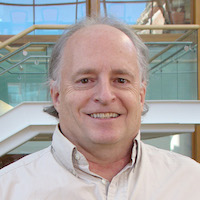ESE researchers awarded large supercomputing grant from DOE
November 23, 2016
A team of researchers including two faculty members and an alumnus of the University of North Carolina at Chapel Hill has been awarded a large grant from the United States Department of Energy (DOE). The DOE’s Office of Science recognizes projects with high potential for accelerating discovery through its Innovative and Novel Computational Impact on Theory and Experiment (INCITE) program; this award is for 115 million core hours of use on Titan, currently the world’s third-fastest supercomputer.

Dr. Cass Miller
Cass T. Miller, PhD, Okun Distinguished Professor of environmental sciences and engineering (ESE) at the UNC Gillings School of Global Health, is a co-investigator for the computational research project supported by the grant. He will work with co-investigator Jan Prins, PhD, professor in UNC’s Department of Computer Science, and principal investigator James McClure, PhD, a computational scientist at Virginia Polytechnic Institute and State University who earned both a bachelor’s degree and doctoral degree from the Department of Environmental Sciences and Engineering at the Gillings School.
Their project, which was highlighted in the DOE’s INCITE program press release, is titled “Advancing Models for Multiphase Flow and Transport in Porous Medium Systems.” The proposed work will advance science by using supercomputer simulation of mathematical models to represent how complex fluids behave in systems containing a solid phase.
Such porous medium systems have a wide range of potential applications including – to name just a few – improving methods for storing carbon dioxide to counteract greenhouse gas emissions, enhancing the efficiency of oil and gas recovery, protecting human health from the effects of contaminant releases into the environment, modeling hydrogen fuel cells and simulating tumor growth.
“We are delighted to receive this substantial award of resources from the DOE in support of what has been evaluated to be important work to advance basic scientific understanding of a broad range of systems of importance to society,” said Miller. “A focus of this work is the evaluation of mathematical models based upon the thermodynamically constrained averaging theory developed by Professor William Gray and myself. These models have the potential to markedly improve our understanding of a broad set of complex systems.”
The researchers’ INCITE award, which has been approved for two years, will begin in 2017.
For more information on the INCITE program, see the DOE website.
Gillings School of Global Public Health contact: David Pesci, director of communications, (919) 962-2600 or dpesci@unc.edu
